We’ve made a lot of upgrades aboard Winterlude over the years and most have improved our lifestyle. I guess you could argue that adding the watermaker improved our lifestyles and the self-steering definitely improved our lifestyles while passagemaking, but on a day to day basis, there is not a single upgrade that compares to my LED lights. Everyone knows that LED lights use substantially less power than regular boat light bulbs. While anchored out for 155 days straight without tying to a dock, our sensibulbs used about .16 amps per hour vs 2 amps per hour with my old cabin lights. Why such a huge improvement? You have to know my husband.
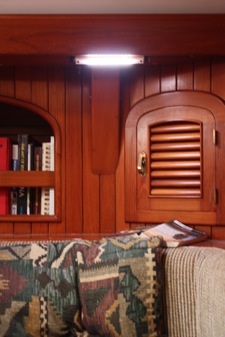
When we first started cruising, David immediately got the nickname “Mr Amp-Ogre” because I was never allowed to turn on any cabin lights due to the 2 amps per hour power consumption – and we had 2 8D gel cell batteries at the time, plus solar & wind. We bought a “candy-bar” type LED reading light in 2004 as a compromise so that I could read after dark. We got it from Stecktronics while we were anchored in Marathon, FL waiting forever for weather to make the crossing to Isla Mujeres. It was, OK, but as with all early LED’s, very directional. Luckily it rotated so I could aim it at the book I was reading. Now in 2012, I’m happy to report it still works great and I still use it.
David survived the early days by wearing a headlamp – he looked more like a spelunker than a cruiser, but we saved amps. He still wears the headlamp while grilling after dark, but luckily not all evening inside the cabin anymore.
In addition, we replaced the anchor light and refit a Davis Mega-Light with LEDs while in Marathon — I’m sure this saved our poor Link 10 battery monitor at least 10,000 clicks with David checking amp consumption literally every 10 minutes. Since anchor lights are not optional like cabin lighting, it drove him crazy until we switched to LED and gradually his Link 10 clicking became less frequent. The Davis mega-light lit up our cockpit, but was so bright, brilliant and blue that nearby anchored boats in Isla Mujeres boats complained about the overbright light eyesore. So we put a “shade” on it to protect nearby eyes and preserve early cruising friendships.
We’ve experimented with LED’s since they came out and now have everything on the boat LED with the exception of the red cabin floor lighting – similar to an airplane’s emergency aisle lights. We never use them, thus have never found the need to replace the bulbs!

The first cabin light LED replacements we tried were dismal failures – the blue light was so faint, we could see vaguely to move about the cabin, but nowhere close to illuminating our cabin. So we wrote LED’s off for the cabin and continued our miserly light tradition until we got to Bocas Del Toro, Panama. What happened in Bocas Del Toro, you ask? One of our buddy boats sailing from Honduras to Panama was appalled that once the sun went down, we spent the next few hours in pretty much total darkness. Damon on sv Bruadair showed us his new Sensibulb’s with the adapter that would fit our existing cabin lights. Wow, they were bright but warm, “regular” light and not super-blue of our first attempt – luckily we had only purchased 2 of the early prototype that didn’t work so well. Sensibulbs though were a different story – we immediately replaced every cabin light with the Sensibulbs – which was a fairly expensive project, but oh the light! Now they’re even more expensive – available at Defender, but since 2007 — 5 years, the only failure we’ve had is in one of the adapters which we replaced for $3.59.
Poor David. Leaving Bocas, we anchored in the Rio Chagres for the first week after replacing the lights. David went through a fairly severe period of withdrawal – he was so addicted to being the amp-ogre that I had to continually reinforce .16 amps/hour versus over 2 amps per hour — I could turn on every light in the cabin at the same time and not begin to approach the amps consumed by a single cabin light before! Literally the poor Link 10 battery monitor has a cracked spot near the SEL button that David pressed time after time to check on the amp consumption while I turned on lights in the cabin after dark! 🙂
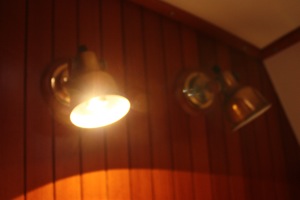
So now we get to the initial rationale for this post … we were looking for an LED bulb to replace the regular bulb in our new anchor light fixture.
On the recommendation of West Marine, we discovered a really useful place for LED light bulbs. The name of the company is MastLight.com. On the website, they have a really useful feature called “Click Here to Look Up a Bulb Type” and they were able to get us LED light bulbs to replace our anchor light with an LED. Plus we were delighted that, unlike the Sensibulbs, these LED light bulbs have come down substantially in price.
From MastLight.com: The cost for these bulbs are yes more than a regular light bulb but if one looks past this and really understands the cost of lighting they will see that a LED bulb will pay for itself in savings on your electric bill now that the energy companies have raised the price it cost to light your house. Just look at this cost for a 75 watt incandescent bulb vs. a LED bulb and you will understand just that.
Number of hours used per day
4
4
Number Of days used
300
300
Number Of bulbs in used
1
1
Number Of Watts Per Bulb
75
2
Cost per Kilowatt
0.15
0.15
Energy Cost per year
$13.50
$0.36
you should think about buying a LED bulb and saving the money.

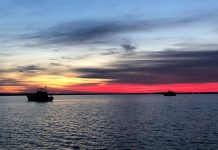
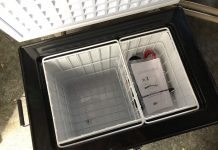
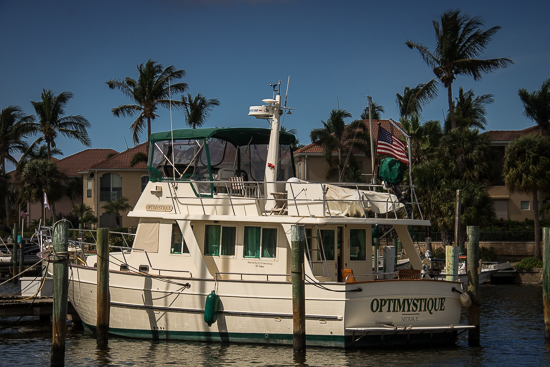









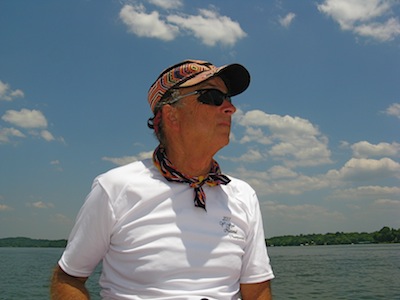
Jan, it seems like whatever project we are working on you or Carolyn post an article on one of your blogs that day. We are just beginning the refit to LED and I really appreciate your links and names of sources. Thanks for the good info. I am also using your info WiFi helpful. If you have any new recommendations on that topic we would appreciate it. Thanks again for your great blog-smooth sailing!
Hello CC! Thanks again for great advice. We also replaced our lighting and it works like a charm.
http://sail2blue.com/2013/02/20/let-there-be-leds/
Sue
s/v Happy Dance